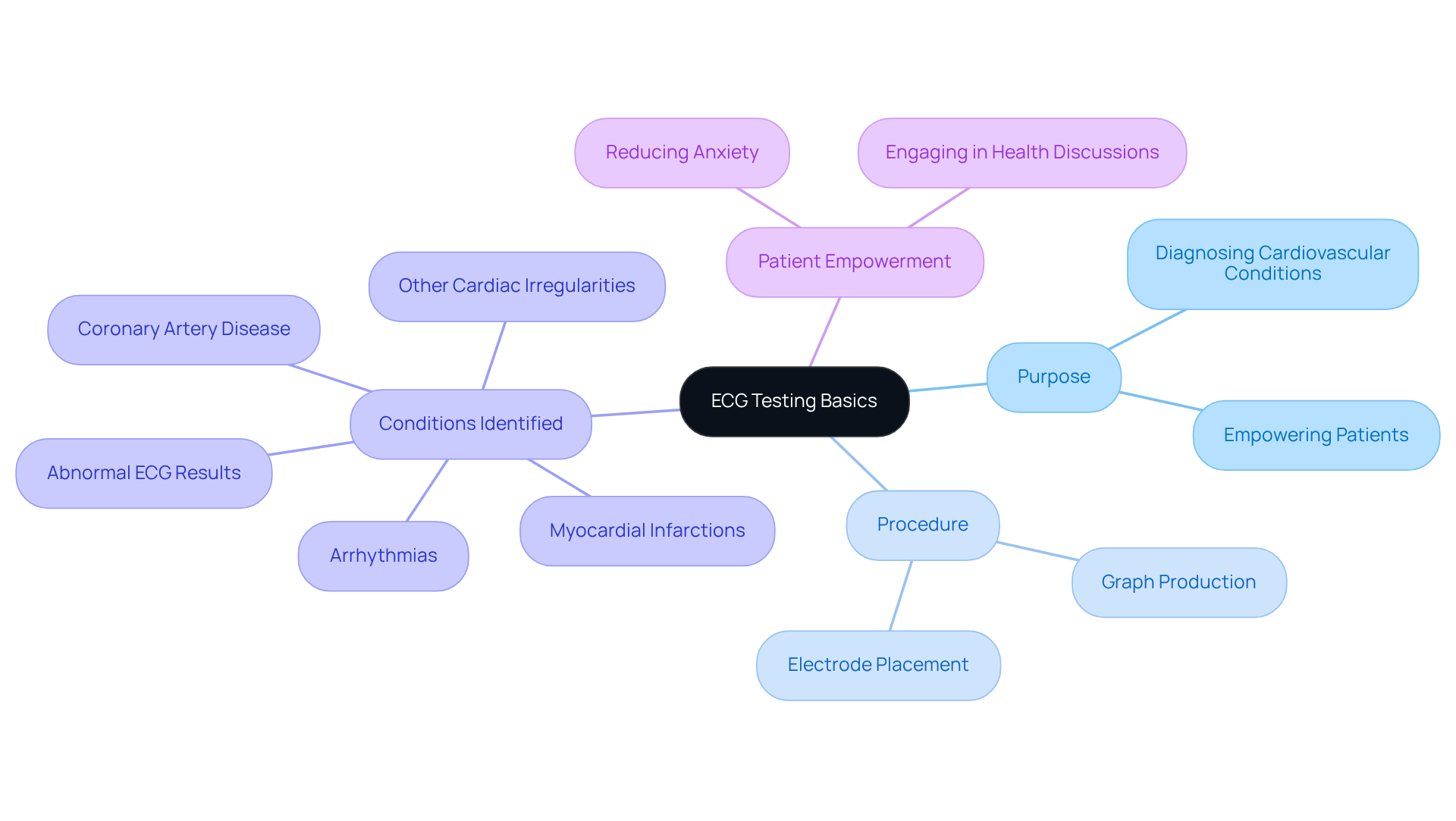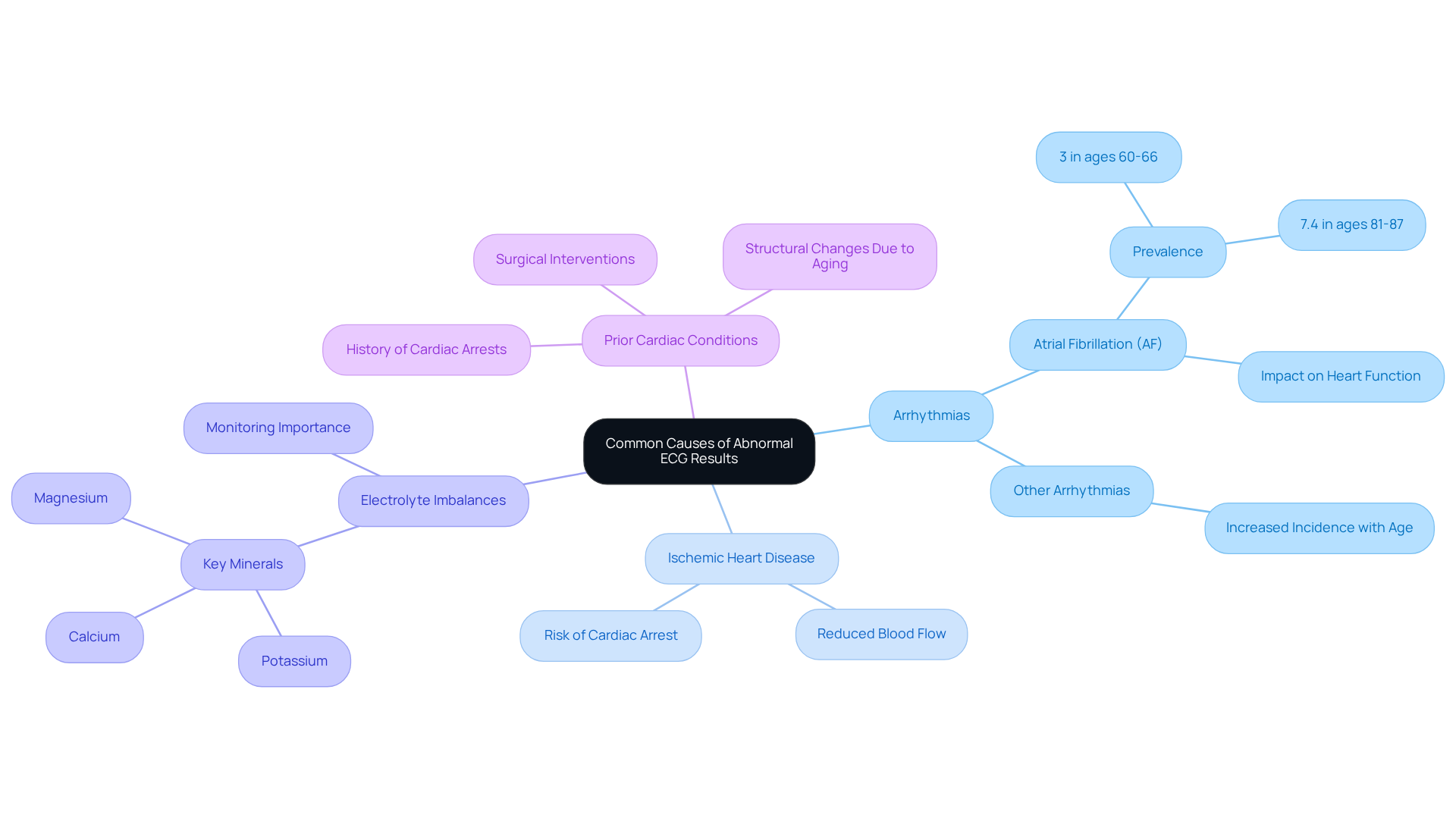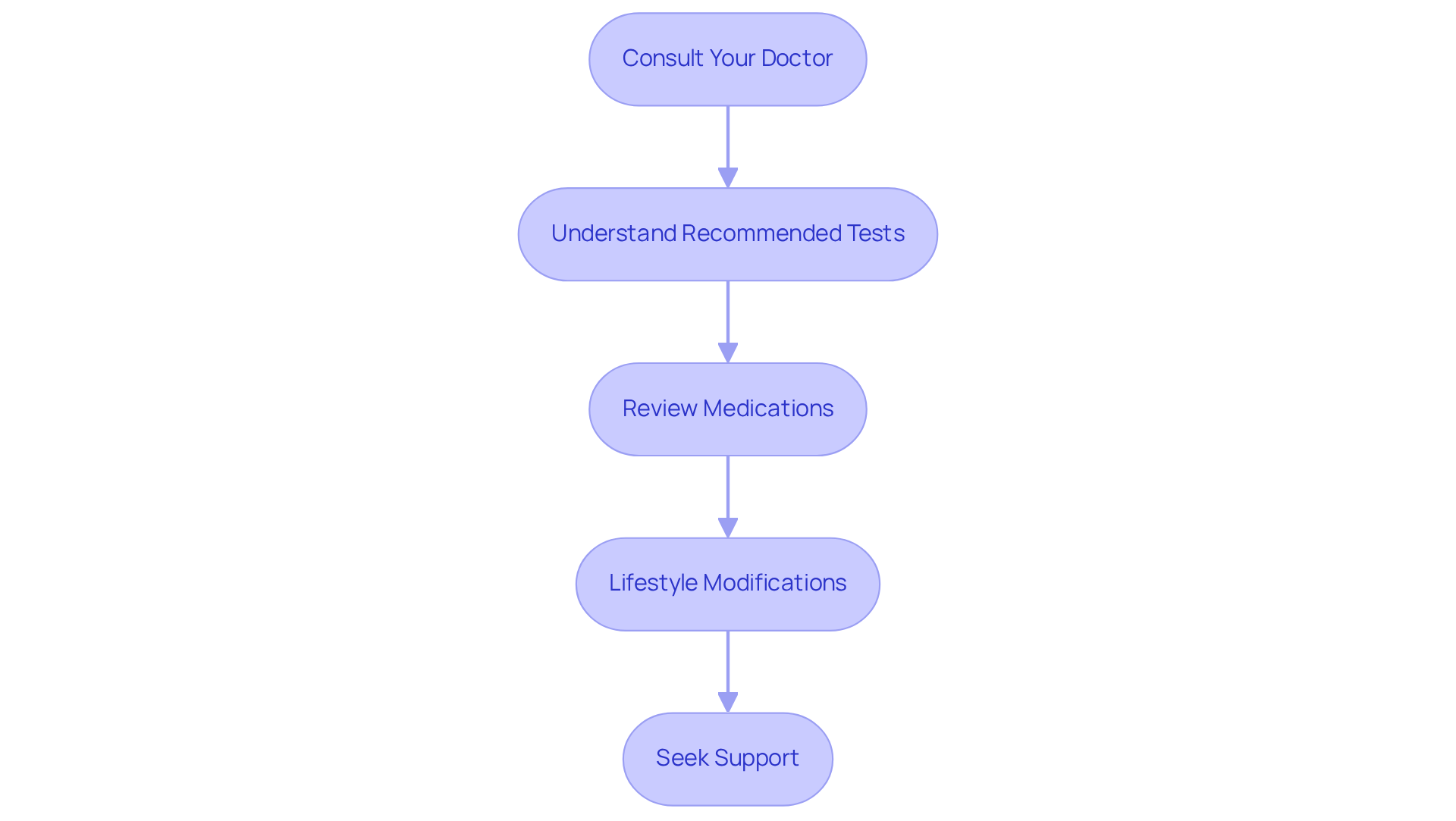


This article highlights the important steps elderly patients should consider after receiving abnormal ECG results to effectively manage their cardiovascular health. It is crucial to consult healthcare professionals who can provide guidance tailored to individual needs. Understanding further testing options is essential, as it empowers patients to make informed decisions about their health. Additionally, reviewing medications with a healthcare provider can help ensure that all treatments are appropriate and effective.
Making lifestyle changes can significantly impact heart health. Simple adjustments, such as incorporating more physical activity or improving diet, can lead to positive outcomes. Regular follow-ups with healthcare providers are also vital, as they allow for ongoing monitoring and support. These steps are not just about managing health; they are about enhancing overall well-being and quality of life.
Remember, you are not alone in this journey. Seeking help and asking questions can lead to a better understanding of your health. It’s perfectly normal to feel anxious or uncertain, but taking proactive steps can lead to improved heart health outcomes. Your health is important, and with the right support, you can navigate this process with confidence.
Abnormal ECG results can understandably cause concern for elderly patients and their families, often leading to questions about heart health and what actions to take next. As millions of seniors undergo this essential test each year, grasping the implications of these results is vital for effective management and treatment.
What steps should patients consider after receiving an abnormal reading? How can they prioritize their cardiovascular health? This guide gently explores the essential actions and insights needed to navigate this complex landscape, empowering seniors to actively engage in their health journey with confidence and support.
An Electrocardiogram (ECG) is a simple, non-invasive test that captures the heart's electrical activity, playing a vital role in diagnosing various cardiovascular conditions. Each year, millions of seniors undergo ECG testing, as it can identify critical issues including:
The procedure involves placing electrodes on the skin, which connect to a device that produces a graph of the heart's electrical activity. Understanding how an ECG works can significantly reduce anxiety for older individuals, empowering them to engage more effectively in discussions about their cardiovascular health with medical professionals.
At Amavita Heart and Vascular Health, our specialists utilize advanced diagnostic imaging, including ECGs, to detect potential cardiac issues early. If an abnormal ECG result or any other abnormalities are found, our team is ready to provide innovative, minimally invasive treatments that ensure same-day convenience and personalized care. We are here to help you return to the life you love, without the disruption of hospital stays. Remember, your health is our priority, and we are dedicated to supporting you every step of the way.

In elderly patients, abnormal ECG results can arise from several key factors, each carrying unique implications for cardiovascular health. Understanding these causes is essential for both patients and caregivers, as it empowers informed discussions about health and well-being. Common causes include:
Arrhythmias: These irregular heartbeats can range from benign to serious, significantly impacting heart function. Atrial fibrillation (AF), for instance, is prevalent among older adults, affecting approximately 1 in 10 individuals over 80 years old. The prevalence of AF increases with age, from 3% in those aged 60-66 years to 7.4% in those aged 81-87 years. Could this be a concern for you or a loved one?
Ischemic Heart Disease: This condition, characterized by reduced blood flow to the cardiac muscle often due to coronary artery disease, is a leading cause of morbidity in seniors. The risk of cardiac arrests and associated complications increases with age, necessitating careful observation and management. It’s important to stay vigilant and proactive in addressing these risks.
Electrolyte Imbalances: Electrolyte imbalances, which involve abnormal levels of essential minerals such as potassium, calcium, or magnesium, can disrupt cardiac rhythms and result in an abnormal ECG result. These imbalances are particularly concerning in the elderly, who may have multiple comorbidities affecting their overall health. Are you aware of your electrolyte levels?
Prior Cardiac Conditions: A history of cardiac arrests or surgical interventions can lead to lasting changes in ECG readings. For instance, structural changes in the heart due to aging can result in increased risks of arrhythmias. It’s crucial for individuals to communicate their medical history effectively with healthcare professionals to ensure comprehensive care.
By understanding these causes, patients can engage in meaningful discussions about the abnormal ECG results, paving the way for necessary lifestyle adjustments or treatments. As cardiovascular experts note, while many arrhythmias may present minimal risk, they can also indicate underlying issues that require attention. Therefore, a thorough approach to interpreting ECG results is vital for enhancing cardiac well-being in older adults, especially in cases of an abnormal ECG result. Remember, you are not alone in this journey, and seeking help is a positive step towards better health.

After receiving abnormal ECG results, it's important for elderly patients to take some thoughtful steps to ensure their health and well-being:
Consult Your Doctor: Schedule a follow-up appointment to discuss your results in detail. It’s essential to ask about what these findings mean for your overall health. Preoperative ECGs are particularly crucial for older patients, as they can uncover significant cardiac issues that may not be easily detected otherwise. At Amavita, our Optimal Program includes comprehensive biomarker panels and cardiac screenings to provide a thorough assessment of your cardiovascular health.
Understand Recommended Tests: Your physician may suggest further examinations, such as echocardiograms, stress tests, Holter monitors, or blood tests, to gain a clearer understanding of your cardiovascular condition. These tests can reveal underlying issues, especially considering that nearly 48.78% of elderly patients have an abnormal ECG result. Amavita offers advanced imaging capabilities that integrate sophisticated tests into your comprehensive care plan.
Review Medications: It’s important to discuss all medications you are currently taking, as some may impact your cardiovascular health. Your doctor can help evaluate whether any adjustments are necessary to optimize your treatment plan. By focusing on personalized approaches, Amavita ensures that your medication plan aligns with your wellness goals.
Lifestyle Modifications: Consider making lifestyle changes that can positively impact your cardiovascular health. This may involve dietary adjustments, increasing physical activity, and, if applicable, quitting smoking. If your abnormal ECG result is linked to risk factors like hypertension or high cholesterol, your doctor can provide tailored recommendations suited to your specific needs. Our programs at Amavita are designed to support you in making these important changes.
Seek Support: Involve family members or caregivers in discussions about your health. Having a support system can make navigating your treatment and recovery more manageable. Healthcare experts emphasize that follow-up appointments are essential for ensuring elderly individuals receive the comprehensive care they need. At Amavita, we prioritize your well-being with ongoing consultations and support tailored to your unique situation.

After an ECG, it is essential to sustain attentive cardiovascular care, particularly for senior patients at high risk for circulatory issues. Here are some key steps to consider:
By actively overseeing your cardiovascular condition and collaborating with your medical team at Amavita, especially if you are at high risk, you can effectively manage potential concerns and enhance your quality of life. For instance, a case study involving a 65-year-old man showed that consistent follow-up and lifestyle adjustments after an ECG led to remarkable improvements in his heart health.

Understanding the implications of abnormal ECG results is crucial for elderly patients and their caregivers. This guide emphasizes the importance of being proactive in cardiovascular health, empowering individuals to take informed steps following an abnormal ECG finding. By recognizing the significance of these results, patients can engage more effectively with their healthcare providers, ensuring they receive the comprehensive care necessary for their well-being.
Key insights discussed throughout the article include:
From understanding the role of arrhythmias and ischemic heart disease to the importance of lifestyle modifications and regular check-ups, each point reinforces the necessity of vigilance in managing cardiovascular health. Seeking support from healthcare professionals and loved ones is vital in navigating this journey effectively.
Ultimately, the path to better heart health begins with awareness and action. By staying informed, making necessary lifestyle changes, and maintaining open communication with healthcare providers, elderly patients can significantly improve their cardiovascular outcomes. Embracing these steps not only enhances individual health but also fosters a culture of proactive care within the community, ensuring that seniors can lead healthier, more fulfilling lives.
What is an Electrocardiogram (ECG)?
An Electrocardiogram (ECG) is a simple, non-invasive test that captures the heart's electrical activity and is essential for diagnosing various cardiovascular conditions.
Why is ECG testing important for seniors?
ECG testing is important for seniors as it can identify critical issues such as abnormal ECG results, arrhythmias, coronary artery disease, myocardial infarctions, and other cardiac irregularities.
How is an ECG test performed?
The procedure involves placing electrodes on the skin, which connect to a device that produces a graph of the heart's electrical activity.
How can understanding ECG testing benefit older individuals?
Understanding how an ECG works can significantly reduce anxiety for older individuals, empowering them to engage more effectively in discussions about their cardiovascular health with medical professionals.
What services does Amavita Heart and Vascular Health offer related to ECG testing?
Amavita Heart and Vascular Health utilizes advanced diagnostic imaging, including ECGs, to detect potential cardiac issues early and provides innovative, minimally invasive treatments for any abnormalities found.
What is the approach of Amavita Heart and Vascular Health towards patient care?
Amavita Heart and Vascular Health focuses on same-day convenience and personalized care, aiming to help patients return to their normal lives without the disruption of hospital stays.